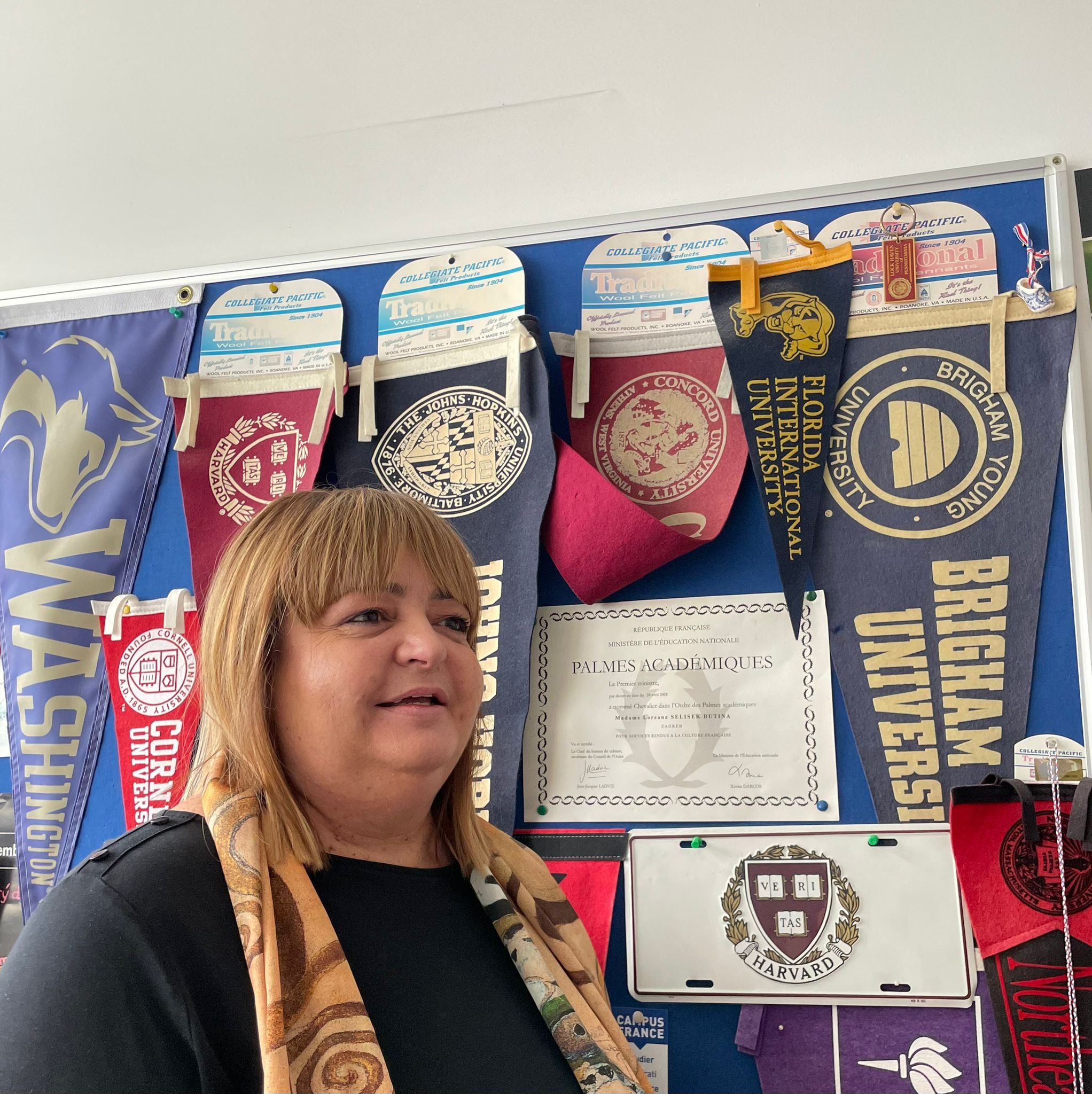Why is CAS such a fundamental part of the IB Program? To gain deeper insight into the role of the CAS Coordinator, the importance of CAS, and the various aspects tied to it, read the following interview with Mrs. Loreana Selišek Butina, the French teacher and CAS Coordinator at MIOC IB, where she discusses what it is that is usually referred to as the heart of the IB Program.
Role and Responsibilities
How did you become the CAS Coordinator?
“I became the CAS Coordinator at our school, as I was first a French teacher, which is my vocation, and after years of experience in being a teacher at our school, I was given the role of CAS Coordinator by the head of school.”
What skills would you say are crucial for this role?
“I would say that the crucial skills for this role are most definitely organization, being responsible, having good time management, being caring, and having empathy. However, these skills are equally important in the classroom, for a teacher.”
Can you tell us about the main responsibilities as a CAS Coordinator?
“As far as being the CAS Coordinator goes, my responsibilities consist of explaining what CAS is to the students that are new to the Diploma Program (3MN). I have to prepare and distribute all of the CAS guides, then I have to organize all of the CAS activities (both in and out of school). I consult students on the best options for them, give them suggestions if they are feeling lost, and then I have to create groups for all of the activities. I communicate a lot with various people from organizations with which our students are involved. Throughout the year, I organize and conduct interviews with 3MN and 4MN students regarding their progress with CAS for that year, and, of course, I read all of the CAS Journals. In short, my responsibilities consist of checking up on all of the students and doing a lot of organization.”
The importance of CAS
Why is CAS such a fundamental part of the IB Program?
“CAS is a fundamental part of the IB Program as it benefits both students and other members of our community so much. CAS is something you do for yourself, it truly helps you grow as a person, develops sincere values in you, but CAS also aids the people around you (both locally and globally). You have to be active students!”
Which kind of values do you think CAS develops in students?
“Through the CAS experience, students really develop values and skills from the IB Learner Profile, all seven of them. They develop skills and values such as inquirers, knowledgeable, open-minded, risk-takers, and caring. This is very important as this is what IB students should be like!”
How would you say CAS benefits students?
“I would say CAS benefits students in the long-run. They start to think in terms of the values that stand in the IB Learner Profile; they think as open-minded students, they help not only their family, or community, but also the world. Additionally, CAS can open doors for you in the future. It can show what kind of person you really are and reflect your interests.
Why students should take CAS seriously?
How does CAS help students prepare for life after school?
“CAS is an integral part of the IB, along with TOK and EE, so I’d say CAS helps students become genuinely good people. I would say that that is the real goal. It should be fun, not a must.”
How do you think CAS benefits communities outside of our school?
“Our students volunteer at various places. They interact with different age groups; they help children with their homework in schools, volunteer in kindergartens as well as in homes for the elderly. We make use of these young people in the community to help and, in the end, to make it a better place for all who live in it.”
How does participating in CAS help students step out of their comfort zone and grow?
“This definitely depends on the student. What I can say is that you have to be an active student. Think about how you can help? What you can do to help? Whatever you do, make sure you’re stepping out of your comfort zone, do something different, and that will certainly make you grow.”
Insight
What kind of activities do you think best represent the “Creativity”, “Activity”, and “Service” aspect of CAS?
“There are many activities offered by the school for each aspect of CAS. The C, A, and S aspects are meant to encourage balance. The student should choose their Creativity, Activity, and Service based on their own interests and passions. For Creativity, we have options such as Film Group, Ceramics Group, Origami Group, and more. Activity includes all sports and aerobics. The school helps arrange various Service activities like helping kids in kindergartens or seniors in elderly homes. These are led by the school and can help people in need.”
Which advice would you give to students struggling to balance CAS and school work?
“CAS should be something done after school. So you do your schoolwork and devote 3 hours (1 hour for each aspect) each week to your CAS activities. I know you have homework and everything, but you still must engage in CAS as young people. You collaborate with others, and learn to be creative and take care of your body and soul.”
Why do you think it is important for students to engage in all aspects of CAS (“Creativity”, “Activity”, and “Service”), and not just focus on one?
“This sort of balance is an essential part of the IB program. Academics and subjects within school are important, but CAS activities help students become well-rounded outside the classroom.”
CAS Project
What is a CAS Project?
“The CAS Project is the second part of CAS. CAS must be done for 18 months in continuum for around 1 hour each week for each of the three aspect. In other words, 3 hours per week after school for CAS. CAS Projects can be offered by the school. These involve 1 month of preparation, followed by doing the project. This can be collecting money or something similar. You need time for investigation, preparation, and then demonstration. That is the essence of a CAS Project.”
What kind of advice would you give to students struggling with their CAS Projects?
“The problem for students with CAS Projects is picking which one they want to do. Students should come to me with their ideas. I will give them advice and help them on how to approach their CAS Project. It involves the steps of investigation, preparation, and demonstration.”
What are some examples of well-executed CAS Projects you have seen at our school?
“Students helped raise money after the earthquake. They bought clothes and food, and they helped around the houses. However,what is most important is to talk and communicate. Talk to the people, that’s most important.”
CAS Journal
Could you tell us more about the CAS Journal?
“The CAS Journal is evidence of the student’s CAS engagement and activity. It’s the evidence of your process of doing CAS as an IB student. You should write down what you did, how you felt, and what you want to change for next time. It should focus on learning from the outcomes. You should follow the progress of learning outcomes with your journal throughout your CAS experience.”
Could you go over a general outline for an entry of the CAS Journal?
“Like I said, it should include what you did, your reflections, and any possible improvements for next time. Think about what you want to do better. Each activity should have an entry, which could be built around an hour of your CAS activity, but it doesn’thave to be. Focus on quality over quantity. It’s also better to split activities over time, so don’t do 3 hours of the same activity in 1 week. Keep up with your journal for the full 18 months. Spread it over the whole period you dedicate to CAS and make sure to participate in CAS during the summer too. For example, you can clean the countryside or seaside.”
Is the CAS Journal assessed? If so, how?
“Yes, both CAS and the CAS Journal are assessed. There are 3i nterviews and in them, everything about CAS, including the journals and CAS Projects, is assessed. It’s about checking to see how the students are doing and progressing with their CAS experience.”
And there we have it: Advice directly from the CAS Coordinator. Clearly, CAS is an essential part of the IB program, but also of helping students develop outside the classroom. Many positive CAS Projects and experiences have been seen in the school, and there are many more to come. Every part of the CAS experience should be carefully documented in your CAS Journals, as it can be a great pathway into good universities that take great interest in CAS. It can showcase your personality and interests, while also highlighting your balance and time management. While it may be difficult to manage CAS, academic activities, and additional responsibilities, it can be very worthwhile in the long run!





